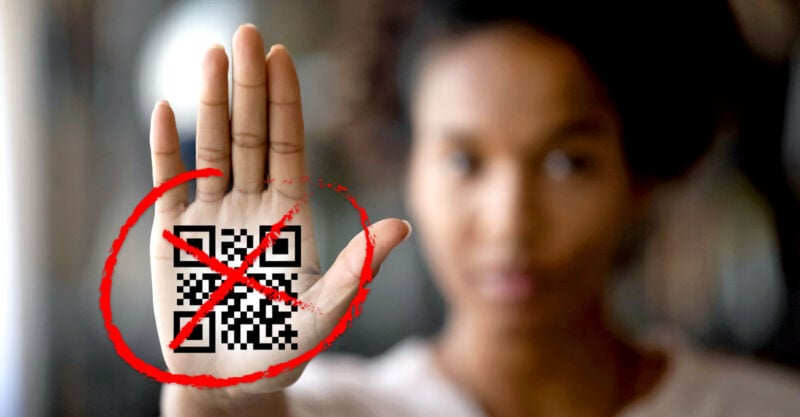.gif)
![]()
|
|
Smart Phones: Bait and Hook into
the Digital Concentration Camp
| NBB: People have an addictive love affair with their smart phones. For many, it seems their entire world comes out of their smartphone. Those people are referred to as smartphone zombies, unable to connect with the natural world and unable to do any critical thinking.
This is exactly what the conrollers are aiming for... to have everyone's personal data in one spot for ultimate control...what Catherine Austin Fitts calls a "digital concentration camp." It appears Shaw was correct.
|
 |
Reject Real ID, Don’t Use QR Codes Ever
By Brenda Baletti, Ph.D., October 28, 2024
Nurse and author Twila Brase joined CHD.TV and"The Solari Report" to discuss the dangers of Real ID and QR Codes and how people can resist them.

|
"They’re trying to build a control grid and they’re building it in different steps,” Catherine Austin Fitts, founder and publisher of “The Solari Report,” told viewers of “The Financial Rebellion” on an episode of “Good Morning, CHD.” Biometric scans, QR codes, Real ID, and digital money — they’re all steps in that process, said Austin Fitts. “And when they all link together, you are in a digital concentration camp and they can take all of your assets, they can take your kids, they have complete control,” she said. Some people oppose some steps and not others, Austin Fitts said. Conservatives tend to support a biometric surveillance system at the border, for example. But people don’t understand that the pieces are all part of building a total biometric surveillance system. Austin Fitts — the former U.S. assistant secretary of Housing and Urban Development — cited historian Carol Quigley, who argued that part of the goal of financial capitalism was to concentrate financial control in private hands so that those who controlled the financial system could also control the political system. Austin Fitts said today this type of control depends on the ability to centrally control the rules of finance. The central bankers are now merging with big tech, creating a control system. “And they’re doing it leg by leg, bit by bit,” Austin Fitts said. “And if you buy into the different bits, it’s going to snap together.” She likened it to marching into the slaughterhouse. “We are helping to build our own prisons. You’ve got to back out,” she said Austin Fitts said the key to a successful financial control grid is a high-quality national ID system like the national Real ID, that can be aggregated globally. Co-host Carolyn Betts explained that in 2005, Congress passed the REAL ID Act, establishing a national system for sharing driver information across states. The system included federal requirements for more onerous forms of identification to obtain a driver’s license.
Under the law, a Real ID would be needed to access some federal facilities, commercial aircraft and nuclear power plants. The federal government has been trying to push the program forward, but almost 20 years after the law passed, it hasn’t been fully implemented. Twila Brase, R.N., is co-founder and director of Citizens Council for Health Freedom, a health privacy nonprofit that has been challenging the Real ID. Brase, author of “Big Brother in the Exam Room: The Dangerous Truth about Electronic Health Records,” said the places and services that could require a Real ID may be expanded if people don’t resist. She said her organization was concerned people would be required to have a Real ID to access healthcare — or anything else, including government services. Brase said several states resisted the program initially, which is partially why it stalled. However, in 2020, the U.S. Department of Homeland Security (DHS) worked with state DMVs to move it forward nationally. All states now plan to implement the program, although 45 states don’t yet require them. Brase said there’s a push — in the form of a regulation proposed by the Transportation Security Administration (TSA) and the DHS — to make the system national by May 7, 2025. Her group has been educating people on how to resist the IDs. She said 31,764 concerned people commented on the proposed rule before the Oct. 15th deadline. Brase also said 44% of driver’s licenses are not Real ID-compliant. She suggested that that number to could grow, if people return their Real IDs — which many people don’t know they have — and replace them with regular ones. She also noted that people can fly with passports if they want to resist getting a Real ID. People can find out if they have a Real ID by visually inspecting their licenses. Real IDs have a special symbol — usually a star. Also, if a license isn’t a Real ID, it will typically say that the ID is not for federal identification purposes, or something similar. Brase said the move toward Real ID is also a move toward a mobile ID that could be uploaded on a cellphone. This would facilitate new forms of surveillance, she said. For example, a proposed bill in New Jersey would allow people to have mobile driver’s licenses that they carry on their phone or any internet-ready device.
‘Don’t use QR codes ever. Period. No exception.’ Austin Fitts told viewers she views QR codes as “one of the legs of the digital concentration camp that is going to snap into place.” QR codes are easy to hack and manipulate, she said. She played a news clip explaining how the codes can be modified to include commands the user is unaware of. For example, some QR codes can make your phone download malware that gives others access to your phone. Or they can run data-collection software in the background. “The moral of the story? Don’t use QR codes ever. Period. No exception,” the news clip advised. Austin Fitts pointed out that when companies like Google make QR codes, they can capture data that they aggregate with all the other data Google already has about users. CHD.TV Program Director Polly Tommey said at Children’s Health Defense, fundraisers have been concerned that if a nonprofit doesn’t use QR codes, people won’t donate, because QR codes offer a convenience people have come to expect. She asked Austin Fitts how she would respond. “I do think it makes it more convenient to raise money from people who don’t know better in the short run,” Austin Fitts said. “But in the long run, you’re talking about a system that is going to basically drain or steal all the assets of everybody….it’s like getting a sugar fix that kills the patient.” Betts said these digital issues can be hard for people to understand. “Unlike the gulags in prisons of the past, where you could actually see the bars, they can’t be seen today, right? They are invisible.” Most Americans don’t understand how this all works, she added. “So it’s much harder than if you actually had real bars to convince people that this gulag is being created.” Watch ‘Financial Rebellion’ here:
|
|
URL for this article: NewsBitsAndBites.com/ article3/reject_real_id-url.shtml |

